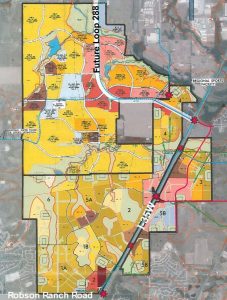Cities usually change slowly over time. In the normal course of things, they undergo measured, organic growth and take decades to reach population milestones. City leaders, in turn, usually have the luxury of planning at the same pace. In the past, most of Denton’s leaders’ decisions affected small groups of people and left plenty of room for later course corrections.
These days, however, our booming economy means a booming population and rapid housing growth to accommodate our new neighbors. As a result, we have less developable land than we once did. When farms and pastures become subdivisions, what land we have left is also more likely to include important wildlife habitats and areas of natural beauty.

This is why the 6300+ acre Hunter Ranch and Cole Ranch developments in southwest Denton present a once-in-a-generation opportunity. Most importantly, to develop over 10 percent of our city’s land area strategically, not reactively. And to master plan roads, parks, school sites and services in an area which we might otherwise have designed piecemeal over many years. But also to preserve green space and environmentally sensitive areas in the process.
Denton involuntarily annexed this private land in the 2000s. The owners subsequently secured zoning to build more than 20,000 homes and millions of square feet of commercial space, with fairly standard development requirements. In 2018, they came back to the City of Denton for permission to create special tax districts that would help them build the infrastructure these massive projects will require. But of course they needed to give us something in return. Through shrewd negotiation (and excellent work by city staff), I and other city leaders were able to secure important concessions like:
- Binding conservation easements for Pilot Knob and other natural areas
- 2,111 acres of parks and greenways
- Sites for 4 elementary schools, 2 middle schools, and a high school
- 58 miles of hike and bike trails, connected to our trail network
- Much larger setbacks between homes and gas wells
- Greater transparency and engagement for residents in the districts
- Capital contributions to our affordable housing program
- Greater control over quality and design of infrastructure like roads, water, wastewater
- Updated code requirements
- Reduced housing density
All of these are in addition to the inherent benefits of the project, including more high-quality homes and multifamily housing, more grocery stores, more space for businesses, more employment opportunities, and more tax revenue to support city services.
These are long-term projects, and could take up to 40 years to fully build out. But residential construction may start as early as next year. Commercial development like stores and offices will soon follow. Yet another reason it was wise to master plan this new sector of Denton, rather than let come-what-may.
Feel free to contact me on these issues and any others before the Denton City Council at [email protected]. I look forward to hearing from you, and I’ll see you around town!








.jpg)





